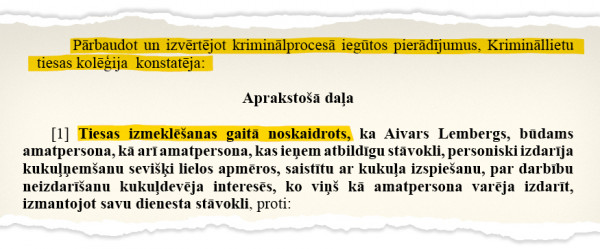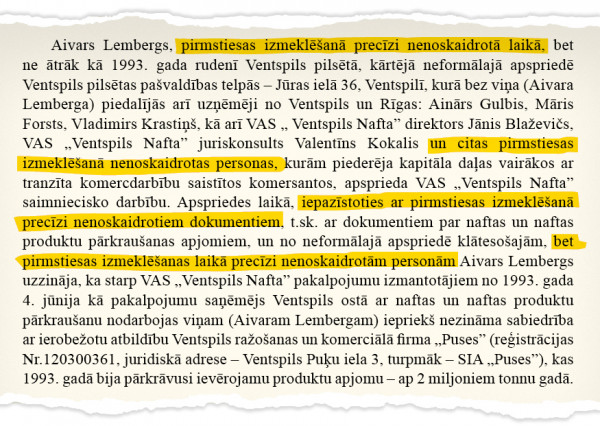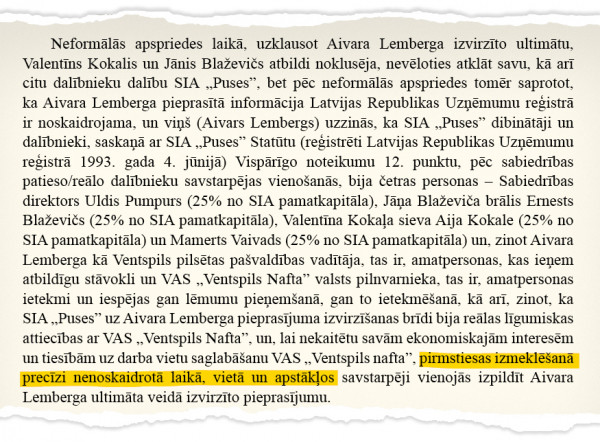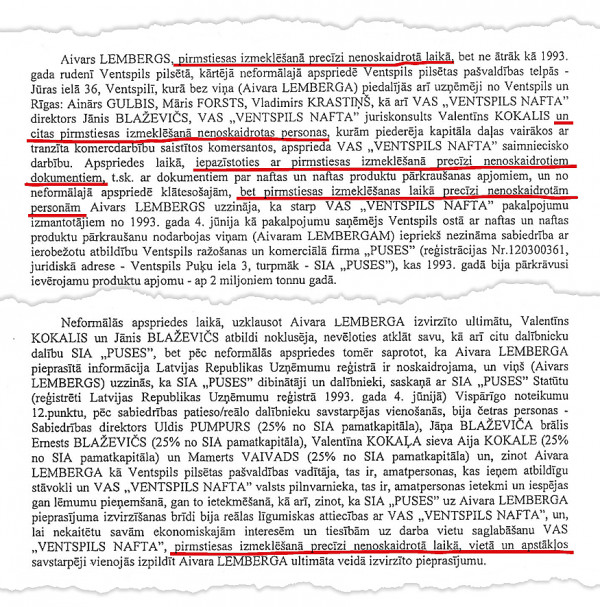The court in Lembergs case specifies that the pre-trial investigation didn't specify much
The judgment in the Lembergs case is a striking example of the absurdity that can be reached when the court itself does not want to find out the truth, but merely rewrites the prosecutors' accusation word for word, comma for comma.
Neatkarīgā's publications have repeatedly shown with examples that the judgment in the Lembergs case is a copy-paste of the prosecution's accusation and the prosecutors' speech, while the defense arguments are not analyzed at all or are analyzed in a very superficial and rather formal way.
The appeals lodged by the defense, on the other hand, reveal more and more absurdities to which the court can drive itself by copying the prosecutors' arguments without any independent analysis.
20 "facts" are not specified
The judgment in this case, after its formal introduction, begins with the words "The judicial investigation has established", but then repeats the phrase "at a time not precisely specified in the pre-trial investigation", "at a place not precisely specified", "by persons not precisely specified", etc., word for word, as in the prosecution's accusation, many times.
For example, in the episode of how Aivars Lembergs allegedly extorted shares in SIA Puses from the former Ventspils prosecutor (at that time chief lawyer of the state-owned company Ventspils nafta) Valentīns Kokalis in autumn 1993, more than 20 "precisely unspecified" facts are mentioned in the judgment.
The judgment states that:
nine acts took place "at a time, place and under circumstances not precisely specified in the pre-trial investigation",
four acts took place "at a time and place not precisely specified in the pre-trial investigation",
three acts took place "at a place and under circumstances not precisely specified in the pre-trial investigation",
one act took place "at a time and under circumstances not precisely specified in a pre-trial investigation",
four acts took place "at a time not precisely specified in the pre-trial investigation",
four acts involving "persons not precisely specified in the pre-trial investigation",
in another episode, the participants had access to "documents not precisely specified in the pre-trial investigation".
See for yourself!
Here are excerpts from the judgment in the Lembergs case.
After the formal introduction, on one page, the following text follows:

Having examined and assessed the evidence obtained in the criminal proceedings, the Criminal Cases Chamber found:
The descriptive part
[1] In the course of the judicial investigation it has been established that Aivars Lembergs, in his capacity as an official, as well as an official in a position of responsibility, personally committed bribery of a particularly large amount, involving the extortion of a bribe, for failure to perform acts in the interests of the bribe-giver, which he as an official could have done by using his official position, i.e:
The following two pages are devoted to listing the positions of Aivars Lembergs at the time when, according to the prosecutors and now also according to the court of first instance, the extortion of shares in SIA Puses from the former Ventspils prosecutor Valentīns Kokalis took place in the autumn of 1993, i.e. more than 28 years ago.
Among other things, by copying the accusation word for word, the authors of the judgement even created some complete absurdities in the list of Lembergs' positions (more on this in a future publication).
The judgment goes on to describe, on pages 4 to 10, the events which, according to the prosecutors and the court of first instance, were connected with the extortion of the shares in SIA Puses. The description of the autumn 1993 event in the judgment begins with the following two sentences:

Aivars Lembergs, at a time not precisely specified in the pre-trial investigation, but not earlier than in the autumn of 1993, in the city of Ventspils, at a regular informal meeting in the premises of the Ventspils City Municipality, 36 Jūras Street, Ventspils, which was attended by businessmen from Ventspils and Riga in addition to himself (Aivars Lembergs): Ainārs Gulbis, Māris Forsts, Vladimirs Krastiņš, as well as Jānis Blaževičs, Director of Ventspils Nafta, Valentīns Kokalis, Legal Advisor of Ventspils Nafta, and other persons not specified in the pre-trial investigation, who owned shares in several transit-related companies, discussed the business activities of Ventspils Nafta. During the discussion, having familiarized himself with documents not precisely specified in the pre-trial investigation, including documents on the volumes of transshipment of oil and oil products, and from persons present at the informal discussion but not precisely specified in the pre-trial investigation, Aivars Lembergs learned that among the users of the services of SJSC Ventspils Nafta since June 4, 1993, a previously unknown to him (Aivars Lembergs) Ventspils production and commercial limited liability company Puses (registration No 120300361, legal address - 3 Puķu Street, hereinafter referred to as SIA Puses) had been engaged in the transshipment of oil and oil products as a service recipient at the Port of Ventspils, which in 1993 handled a considerable volume of products - around 2 million tons per year.
The judgment then contains the following single sentence, which runs for 19 (!) lines:

During the informal discussion, when hearing the ultimatum put forward by Aivars Lembergs, Valentīns Kokalis and Jānis Blaževičs concealed their answer, not wishing to disclose their own and other members' participation in SIA Puses, but after the informal discussion they understood that the information requested by Aivars Lembergs can be clarified in the Register of Enterprises of the Republic of Latvia and he (Aivars Lembergs) will find out that the founders and members of SIA Puses, in accordance with the General Provisions Paragraph 12 of the Articles of Association of SIA Puses (registered in the Register of Enterprises of the Republic of Latvia in June 4, 1993), by mutual agreement of the true/real members of the company, were four persons - Uldis Pumpurs, Director of the Company (25% of the share capital of the SIA), Ernests Blaževičs, brother of Jānis Blaževičs (25% of the share capital of the SIA), Aija Kokale, wife of Valentīns Kokalis (25% of the share capital of the SIA) and Mamerts Vaivads (25% of the share capital of the SIA) and, knowing the influence and possibilities, both in decision-making and in influencing decisions, of Aivars Lembergs as the head of Ventspils City Municipality, i.e. an official holding a responsible position and a state proxy of SJSC Ventspils Nafta, as well as knowing that at the time of Aivars Lembergs' request SIA Puses had a real contractual relationship with SJSC Ventspils Nafta, and in order not to harm their economic interests and their right to keep their jobs at SJSC Ventspils Nafta, they mutually agreed to comply with Aivars Lembergs' ultimatum request at a time, place and circumstances not specified in the pre-trial investigation, and in order not to harm their economic interests and their right to keep their jobs at SJSC Ventspils Nafta.
Find the differences!
In the accusation signed by prosecutor Juris Juriss, these two paragraphs, three sentences long, look like this, and any reader can try to find differences (even just grammatical mistakes corrected by the court) between the accusation and the first instance judgement:

Who cares about contradictions?
The court's judgment is completely silent as to whether the court tried to find out anything about the "time", "place", "circumstances", "persons" and "documents" that the prosecutors did not specify during the pre-trial investigation.
Thus, in this respect, nothing can be ascertained from the judgment other than that "the court's investigation established that the pre-trial investigation did not specify".
The judgment does not analyze at all the defense version of the events of autumn 1993 in connection with the change of ownership of the shares in SIA Puses - whether V. Kokalis owned the shares at all at that time (among other things, even the passages from the judgment and the accusation posted above show that he did not), whether they arrived to A. Lembergs at all, and, if indeed they did, whether it was extortion of the shares.
The defense constantly drew the court's attention to absurdities in the accusation with questions to V. Kokalis (he was questioned for about 30 hearings) and other witnesses, and at times it even seemed that the court had noticed them (Judge Irīna Jansone started asking V. Kokalis questions herself, which thoroughly annoyed him). In the debate speech, the defense analyzed in detail why the prosecutors in the pre-trial investigation had not been able to establish the exact "time", "place", "circumstances", "persons" and "documents" of dozens of events in the autumn of 1993, because these events had not happened at all - they had been invented for the purpose of creating an accusation.
But the authors of the judgment have completely ignored the defense, for what seems to be obvious reasons: once you start analyzing the defense arguments, the accusation falls apart and no conviction is possible.
Nor have the authors of the judgment analyzed the sometimes ridiculous contradictions in Kokalis' own testimony, which is the main source of the prosecution's version of the extortion of shares from him in the autumn of 1993. Nor have they analyzed the contradictions between V. Kokalis' testimony and that of the other members of SIA Puses.
The law says - the court has to decide itself!
As stated in the appeals lodged with the court, according to the law and case-law, the court must give its own conclusions and findings of fact in its judgment on those facts and circumstances which have been established or not established in the judicial investigation, not in the pre-trial investigation.
The judgment must be based on and motivated by the facts established by the judicial investigation, otherwise the judicial investigation is a mere "fiction and empty formality".
A judgment based on more than 20 "facts" established in the judicial investigation as not specified in the pre-trial proceedings must be revoked, the defense argues.
*****
Be the first to read interesting news from Latvia and the world by joining our Telegram and Signal channels.